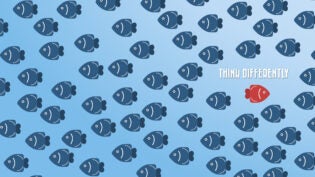Home > Run and Grow > Innovation >
Will My Job Be Completely Different Very, Very Soon?
By: Mike Maddock

Don’t answer “no” too quickly.
“The future ain’t what it used to be.” —Yogi Berra
It is not often you get to coin a phrase to describe a pivotal business phenomena, but we got the chance with our book: Flirting With the Uninterested—Innovating in a “Sold, Not Bought” Category. In it we described a frightening phenomenon for companies—and leaders—that are not nimble (and that is, unfortunately, most companies and many leaders.) We called it the Napster Moment.
That’s what happens when someone with no business being in your business comes along and puts you out of business—the way a 16-year-old did to what used to known as the “record business.”
You may have noticed that Napster Moments are happening more and more often. You also may have noticed that many executives don’t see them coming until it is too late. Just ask the CEOs of the hotel industry who laughed at Airbnb; or the taxi companies that are using legal action to stop Uber in its tracks; or the deans of colleges everywhere; or….
“Control your own destiny or someone else will.” —Jack Welch
Is your company going to become a forgotten bit of history? Is your industry heading for a Napster Moment? Is your expert status at risk?
The symptoms are easy to spot: an inefficient delivery model; forcing customers to buy bundled services that they don’t want/need; the underserving of large parts of your potential market (e.g., millennials or a cumbersome supply chain that is ripe for the picking).
Related Article: 8 Ways to Tell if Your Startup is Ready to Innovate
If your company has built the processes and culture to prepare you for uncertain futures, the symptoms above sound like the start of an amazing race. Giddyup!
The vast majority of us need to keep reading.
Let me give you five industries that I think are going to be in trouble very soon, to show you what I am talking about. But honestly, I think it is harder to find industries that won’t be in trouble than those that will. Most of us are going to see our industries and lives upended.
Insurance
Here you have a noble industry with an antiquated distribution model (agents, complicated paperwork) and outdated communication/jargon.
Mavericks in this industry are working on making their communications more authentic, which means more understandable, down to earth, positive, credible, relevant and memorable. Equally important, they are working to find ways that consumers can interact with their products the way they want to. Think self-directed purchasing and/or customization of products and services.
One solution to winning in this vulnerable industry: If you can’t build the change you need, buy it. Last week, Northwestern Mutual acquired LearnVest (a past client) to help gain its access to the millennial market.
Lending and Payments
If you have a great credit score and have had trouble getting a mortgage, you know how ripe this sector of the economy is for changing. Add to that the growing number of “unbanked” people and the fact that there are too many hands in the consumers’ pocket during just about every step of every financial transaction, and you understand the opportunity here.
True story: I gave up on refinancing our home yesterday because the amount of documentation required was a nonstarter. It was clear it would literally take months to complete the process. My time is worth more than a half a point in interest. I suspect I am not alone.
Enter crowdfunding companies and technology solutions that are able to fund things on smaller scales than banks and traditional lending institutions or offer completely different ways to pay. Facebook just got into the payment business following the lead of Square—another disruptor that made it possible for anyone, anywhere to take credit cards.
One solution to winning in this vulnerable industry: Use data differently. There are plenty of ways to predict credit worthiness beyond credit scores, debt and income. In the future, these lagging indicators will be seen as marginally reliable at best.
Traditional Entertainment (think recording/filming studios, publishers, etc.)
The world now has ADD and more and more and more free entertainment options. Why should I pay for films, music and books when the ongoing democratization of creation serves content up whether or not I have a telephone or cable wire coming into my house? Cocreation through social media, smart phones and creative communities is putting traditional entertainment manufacturers and distributors on their heels.
The power is shifting. Just like when the music industry had to deal with Napster and iTunes, traditionalists must figure out how to get on the “right side” of this change.
Facebook, Google, Apple and Amazon are increasingly taking power away from movie, book and film companies. Who would have thought YouTube would become the place to release big-ticket movies?
One solution to winning in this vulnerable industry: Take a page out of the App Store’s playbook and look at ways to distribute customized content to specific targets. If you can’t add some type of value beyond “bundling and speed,” all will be lost.
Real Estate and Lodging
One reason these industries are ripe is the cost factor. Have you ever looked at what you are actually paying in taxes when you checked out of a hotel in a big city? Or have you done the math on the 6 percent you pay a real estate broker to sell your house? That’s a lot of money. And today’s consumers will do more than just the math—they’ll seek out other options if you don’t provide the value they demand.
What would happen if Airbnb, now one of the largest hotel companies in the world, gets into the home selling business?
One solution to winning in this vulnerable industry: Angie’s list is working to become the trusted advisor to all things home. How do you harness the knowledge of the entire community to add value to buyers and sellers?
Medical, Dental and Veterinary Care
These industries are ripe because of hassle factors, mistrust of providers, mistrust of insurance companies, and patients being at the mercy of providers. Patients need to have more control over their care and outcomes.
The changes here have been incremental: one-day surgery centers, emergency care facilities and the like. But the innovations are only marginally better than the ones that came before them.
One solution to winning in this vulnerable industry: Stop asking the doctors and the vets what the patients need. They will answer “more comfortable waiting rooms” instead of asking “Why do we make people wait?” Look for your solutions in companies and organizations that deliver unsurpassed customer service and empathy. Respectfully, too many industries try to solve problems with the same level of intelligence that created them; your experts are too rooted in the past to conceive the solutions your customers will demand and get one way or another.
As I said, this is just a partial list of the types of companies that may be in trouble soon. Law services are going to be upended; so, too, is car buying (even if you do your shopping online, actually “closing” on the deal takes hours); college text books won’t cost north of $100 in the near future; fitness will be about communities, performance measurement, virtual accountability and competition; accountants are going away; consumer auto insurance will be about people and minutes, not capital equipment; retail stores will be more about experience than products….
You get the idea.
If you walk away from this article saying, “We need a disruptive idea,” you’ve only described half of the equation. Ideas are like seeds and your culture is like soil. Too many executives plant seeds in bad soil. The solution is to work on your portfolio of ideas at the same time you are creating a generative culture that knows how to look outside its walls for the future that is coming faster and faster.
This article was originally published by Free the Idea Monkey
Published: July 20, 2015
2680 Views
2680 Views












